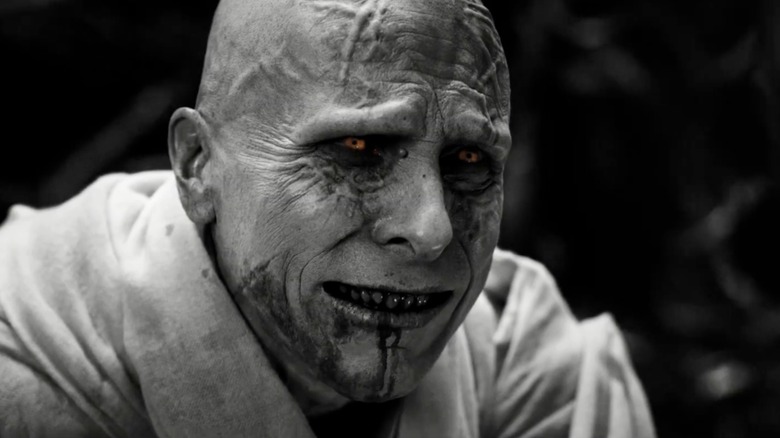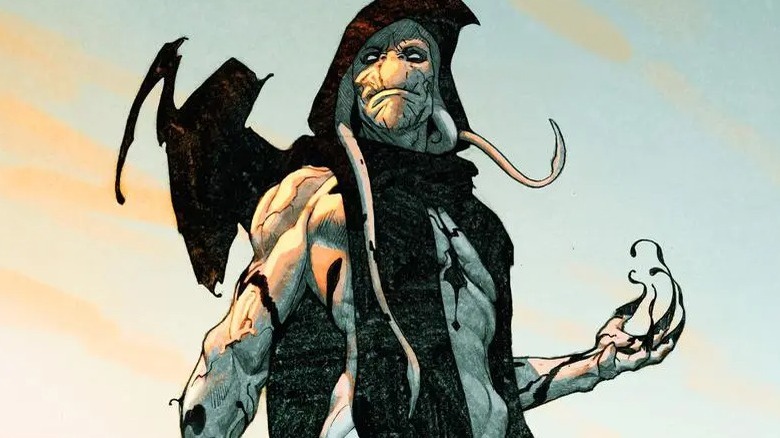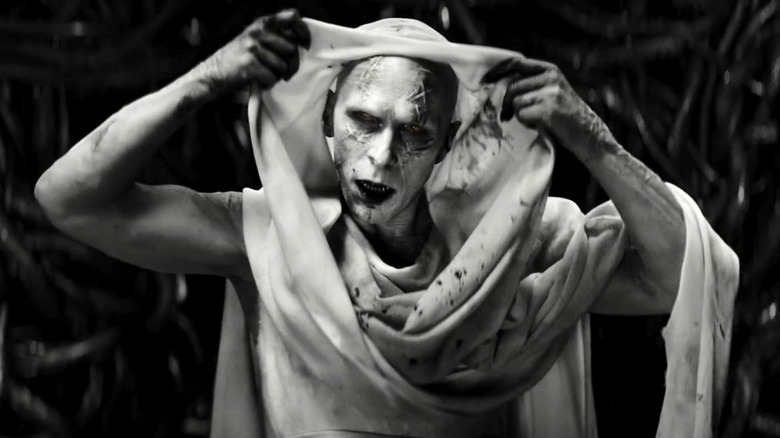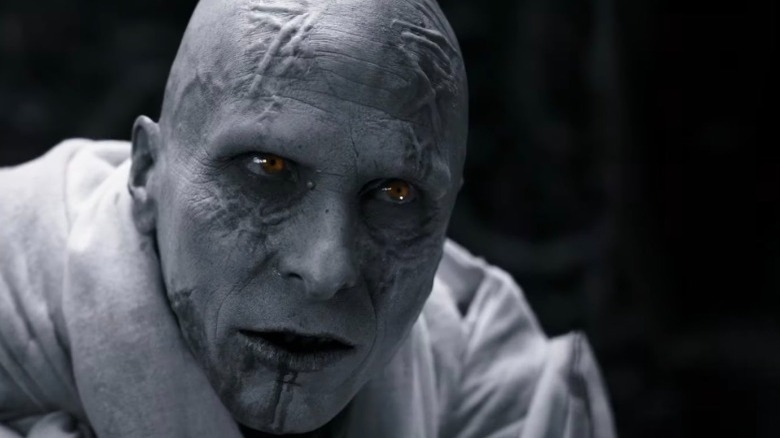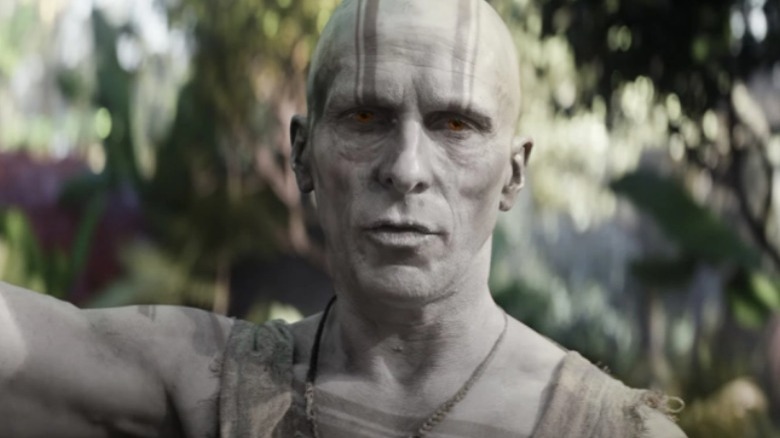Why Christian Bale's Gorr The God Butcher Is A Refreshing Marvel Villain
Warning: Major spoilers ahead for "Thor: Love and Thunder."
Irrespective of whether you feel satisfied or underwhelmed by Taika Waititi's "Thor: Love and Thunder," here's something I guess everyone can agree on: Christian Bale is terrifying as Gorr the God Butcher, and elevates every scene he is in. The newly-introduced Marvel villain is more of an anti-hero in Waititi's latest installment, as his turn to the dark side is fueled by loss, which is leveraged by the sentient Necrosword — and he eventually finds his way back to love, forsaking revenge in the process.
What makes Gorr such a unique Marvel villain is how complex and layered he is in terms of his motivations, as his actions are a far cry from Thanos' grand plan of rebalancing the universe by annihilating everyone in the "Avengers" films. Unlike Thanos, whose comics origins paint him as someone innately drawn to nihilism and entropy, Gorr goes from being a devoted, hopeful man with utter faith in the gods to being the God Butcher.
This is a pretty interesting trajectory, considering how he chooses to use the one wish granted to him by Eternity in the end. Here's a look into Gorr's origins, both in the film and the comics, why he is such a refreshing villain in the context of an MCU property, and how he could pave the way for better, fleshed-out Marvel villains.
Sculpted by pain, emboldened by revenge
Although there is no dearth of villains and anti-heroes with tragic backstories in the MCU — take Wanda (Elizabeth Olsen) in "Doctor Strange and the Multiverse of Madness, for instance — Gorr is an extremely compelling character right up till the end. Gorr's comics origins are far more steeped in pain and loss when compared to "Love and Thunder," as he experiences one personal loss after another, including the untimely death of his parents and two of his children. It is only when his last-surviving child, Agar, dies in his arms, that Gorr renounces the ways of his culture, for which he is ostracized by his community and branded as a corrupted soul.
Even though "Love and Thunder" does not delve deep into Gorr's past, the opening scene with his daughter functions as reason enough for him to embark on his mission to erase divinity. Not only is he ridiculed, but also rebuked for his expectation of repairing an eternal reward for his dedication to the gods. Already on the edge of anguish when he learns that the gods do not care about him, or anyone, the lure of the Necrosword grants him the powers to become the aggressor — Gorr transforms from a powerless, broken being at the mercy of the gods into being one that can take down the mightiest of immortals.
Gorr's character is worth empathizing with to a certain extent, until, of course, he decides to use Asgardian children as bait to lure Thor's (Chris Hemsworth) Stormbreaker into the picture. Gorr's hatred for the gods is proven right during the Zeus scene in Omnipotence city, as the Greek thunder god cares more about his image as opposed to protecting endangered children, choosing to be cocooned in complacency instead of jumping into action. There are exceptions, of course, as not all gods choose to react that way — a prime example being Thor himself, who has always cared about people, having saved the Earth on many counts just because he wanted to.
He gaslights, but he can also empathize
A scene that stands out among all Gorr sequences (which are all standouts, in one way or another) is the one in which he traps Jane (Natalie Portman), Valkyrie (Tessa Thompson), and Thor with the aid of his shadow monsters. Although I feel that Gorr innately understands that Thor is different than the other gods, he is far too blind in his quest for revenge, choosing to sideline this ray of hope instead of holding on to it. This is understandable, as he has suffered the consequences of the negligence of the gods firsthand, plus he already has lost everything dear to him to care at this point, which seems like he has reached a point of no return.
Further, Gorr emotionally manipulates Valkyrie with the aid of mirrored empathy, pointing out how she has also suffered from the indifference of the gods, being a warrior maiden on the battlefield who lost her sisters to a war never waged by the Valkyries in the first place. Gorr is a little more sincere when it comes to Jane, as he senses that she is dying, just like him, but is fascinated by the fact that she chooses to spend her last moments fighting for what's right, instead of giving in to rage-fueled pain, as he does.
Injecting the MCU with another dose of horror
"Thor: Love and Thunder" is obviously extremely tonally different from Sam Raimi's "Multiverse of Madness," as the latter is completely entrenched in horror tropes and highlights what Raimi does best. While "Love and Thunder" remains a genre hybrid in its tone and treatment, Gorr's appearance is genuinely menacing, especially in the way he creeps out from behind the shadows, pale as death, eyes glowing in the dark like some sort of demon. Bale previously mentioned that he partially took inspiration from Nosferatu, which explains his interpretation of the character, which works astoundingly well in favor of the film.
Granted, Gorr's aura and trajectory of actions are more menacing in the comics — he enslaves gods and coerces them to make a deadly Godbomb, and nails the gods who have failed him to crucifixes on his darkness-fueled realm. While Gorr does not quite go full-Gorr in "Love and Thunder," the film recontextualizes his actions, although fueled by a need to avenge, as emerging from pain and pain alone. Gorr's sole reason to unlock Eternity is to wish for the death of all gods, as opposed to literally anything else, such as gaining more power or destroying the universe as we know it.
This potentially makes him much more dangerous, as he becomes a man who is not hesitant to abduct children with the help of shadow monstrosities, in order to fulfill what he is destined to do after becoming the wielder of the God Slayer.
A convincing redemption arc
Redemption arcs are tricky to execute, especially if the individual in question has a history of committing atrocious deeds, running the risk of coming off as undeserved or unconvincing. However, Gorr's change of heart at the end of "Love and Thunder" makes sense, as it is triggered by Thor's empathetic appeal to use his wish to resurrect his daughter, whose death is the sole reason that set him on such a destructive path. Instead of rejecting this notion altogether, Gorr worries about her safety after his death if he were to bring her back, but Thor and Jane reassure him that she will always be protected.
This is a turning point in Gorr's story, as it would take a tremendous leap of faith for him to trust the word of a god again and leave his beloved daughter's wellbeing in the hands of a stranger. However, Gorr is moved by the love shared between Thor and Jane and understands that Thor has experienced pain and loss too, and will act differently than the other gods, which spurs him to make a pivotal choice: he chooses love over revenge.
This eventually lends a whole new meaning to the title, "Love and Thunder," as Thor finds newfound purpose in being a father figure, and protecting Gorr's child, protecting and equipping her to fight for what's right in the process.
"Thor: Love and Thunder" is currently playing in theaters.
